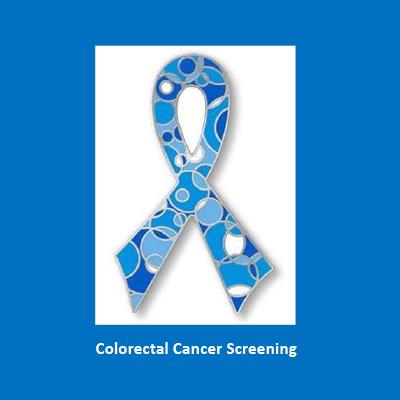DOUG'S STORY
JOAN'S STORY
Who should get screened for colorectal (colon or rectal) cancer?
The U.S. Preventive Services Task Force recommends:
-
All adults get screened starting at age 45, and continue until age 75.
-
If you have a family history of colon cancer, talk to your doctor about when to start.
Over 200 Mainers die from colorectal cancer each year, making it one of the most common causes of cancer-related death for both men and women. With regular screening, colorectal cancer can be prevented before cancer starts. Screening can also find colon cancer early when there are more treatment options. Getting screened for colon cancer could save your life.
What tests are used to screen for colorectal cancer?
Today there are three common ways to test for colorectal cancer. Talk with your doctor about which one is right for you. Any one of them can help save your life!
- Home-based tests detect cancer early by finding blood in your stool. There are two types of home-based tests:
- FOBT (Fecal Occult Blood Test)
- FIT (Fecal Immunochemical Test)
They are safe and easy to do in the privacy of your home. The stool samples are then sent to a lab for testing. These are often used in combination with a sigmoidoscopy.
Things to Consider:
-
- When testing yourself, you’ll come in brief contact with a stool sample.
- May produce a positive result even if no cancer is present (false positives).
- Will need to be done every year if this is the only test you are using.
After a positive test result, a colonoscopy is recommended.
- Sigmoidoscopy looks at the inside of your rectum and lower 1/3 of the colon.
- A thin, flexible tube is inserted into the rectum.
- A tiny video camera at the tip of the tube allows the doctor to see inside.
- There is no sedation, and pre-cancerous polyps cannot be removed.
A sigmoidoscopy can detect cancer early or can prevent cancer by finding polyps (precancerous cells) before they turn into cancer. If polyps are found, a colonoscopy is needed to remove them. A sigmoidoscopy is done every five years, or every 10 years if done with a FIT every year.
This test requires some preparation.
-
- You should follow your doctor’s instructions.
- They will tell you what foods you can and cannot eat before the test.
- The evening before the test, a strong laxative is used to clean out your colon.
- Colonoscopy is a visual inspection of the entire colon.
- The screening is done at a medical facility, usually with sedation or anesthesia.
- A long, flexible tube is inserted into the rectum.
- A tiny video camera at the tip of the tube allows the doctor to view the inside of the colon.
- You will need to have someone take you and pick you up from the test.
One big advantage of a colonoscopy is that polyps, and other types of abnormal tissue can be removed during the procedure. Plus, a colonoscopy only needs to be done every 10 years (if the test results are normal).
This test requires some preparation.
-
- You should follow your doctor’s instructions
- You will need to eat light for a few days before the test
- You will not be able to eat the day before your screening
- You will need to drink lots of liquids
- The evening before the test, a strong laxative is used to clean out your colon
Click here for more information on colorectal cancer screening recommendations.
What is colorectal cancer?
"Colorectal" (from "colon" plus "rectum") includes colon cancer and cancer of the rectum. Most colorectal cancer is in the colon.
Your colon is the long, tube-like organ (also known as the large intestine) that helps your body digest food. A healthy colon takes the water and nutrients out of the food you eat, and leaves a solid waste that your body gets rid of through the rectum and anus. If you could stretch out the colon, it would be about 6 feet long.
Colorectal cancer is a disease that affects both men and women of all racial and ethnic groups.
Cancers are named for the part of the body in which they start to grow, so colon cancer is a cancer that grows in the colon. This kind of cancer starts as a polyp, or small collection of abnormal cells. Polyps do not cause any symptoms so can go undetected for a few years. Regular screening can find and remove the polyps before turning into cancer. This is how colorectal cancer can be prevented.
Click here for more information on colorectal cancer.
Colon Cancer Information Cards:
Lowering Your RiskS
- Know your personal and family history of colorectal cancer:
- Talk to your doctor about your risk of getting colorectal cancer.
- Ask your doctor when you should get screened, and which test is best for you.
- Get screened for colorectal cancer regularly. This increases your chances of preventing colorectal cancer or finding it early.
- Other lifelong ways to help prevent colorectal cancer may include:
- The most important thing you can do to reduce your risk of getting cancer is to not smoke.
- If you don't smoke or use tobacco—don't start. If you do smoke or use tobacco—quit.
- No matter how long you have smoked, quitting can reduce your risk for cancer and other chronic diseases.
- Quitting smoking can be hard for many people. There is a lot of help out there so don't give up—keep trying.
- For more information about quitting smoking or the use of tobacco/nicotine products, call 1-800-QUIT-NOW, or visit MaineQuitLink.com.

- Other lifestyle changes that may reduce your risk include:
- Eating a healthy diet. Limit intake of red meats (such as beef, pork, lamb, or liver) and processed meats (like hotdogs and some luncheon meats).
- Being physically active.
- Maintaining a healthy weight.
- Avoiding alcohol.
- The most important thing you can do to reduce your risk of getting cancer is to not smoke.



